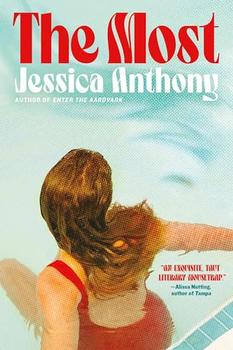Summary | Excerpt | Reading Guide | Reviews | Beyond the book | Read-Alikes | Genres & Themes | Author Bio

In November 1957, Kathleen and Virgil Beckett are living at Acropolis Place, an apartment complex in Newark, Delaware, an arrangement that was supposed to be temporary after their move from Rhode Island but has been drawn out by inertia. It's an unseasonably warm day and the Russians are launching their satellite Sputnik 2 with its canine captive Laika aboard. Virgil readies the Becketts' two children, Nathaniel and Nicholas, for church, while Kathleen, opting to stay home, gets into the complex's swimming pool.
The day unfolds in leisurely but taut fashion. Virgil returns from church and Kathleen refuses to get out of the pool. He goes golfing with colleagues and returns again, and Kathleen still will not get out of the pool. People are staring from their balconies and apartments. What is wrong with this strange woman who will not answer her husband's pleas to emerge from the water and make dinner for their sons?
All the while, the narrative alternates between Kathleen and Virgil's perspectives and memories, unearthing their separate and mutual (but largely separate) disappointments, despairs, mistakes, and regrets. Kathleen was a talented college tennis champion with thoughts of an athletic career when she met Virgil. He was a California native with vague musical aspirations coasting on the same good luck that got him medically discharged from World War II without ever seeing combat.
The Most is a novel about unhappiness in marriage in the vein of Raymond Chandler, John Updike, or Alice Munro. But the most obvious comparison is that it feels like a lost season of the television show Mad Men in its representation of how the strains of marriage, or monogamy really, can pull two people apart, especially when they are living in the pressure cooker of traditional gender values imposed and strictly enforced by mid-century America. It is more engaging than Mad Men in that it focuses more centrally on a repressed housewife who is both vibrantly compelling and unfailingly sympathetic (even when her actions are inscrutable) but less so in that the husband is as handsome as Don Draper but without the intelligence or charm. Virgil's most interesting quality is that he likes jazz and longs to play the saxophone. The fact that he has never bothered to pick up the instrument or learn a note tells you everything you need to know about this character. He's an ambitionless man who breezes through life on his good looks and is too cowardly to pursue his dreams because they would make him different in a way that might bring discomfort. So instead, he cheats on his wife. This is not to say he is an unpleasant character to explore as a reader. Jessica Anthony brings him to life, and takes him apart, with a deft and often excoriating touch.
But Virgil is not the only Beckett who has been unfaithful, and uncovering the extent of Kathleen's duplicity, and the consequences of it, brings a genuine layer of fraught tension that energizes the story. While Virgil dreams of the counterculture, Kathleen is more legitimately chafed by, and dismissive of, the traditional WASP values her husband feels obligated to pursue. In this way, it is clear that despite their differences and their mutual adulterous affairs, the Becketts actually have a lot in common—are perhaps even perfect for each other—in ways that society tries to prevent them from seeing. At a different time, they might fall naturally into an open marriage or some other arrangement that is more suitable than what they have on these pages.
The Most is absorbing, but it feels like it comes from a different era of storytelling. Its depiction of a woman unraveling as a result of misogynist societal expectations and a philandering husband is not especially novel or fresh. That said, there are some exceptional scenes that make the experience worthwhile, and the book is only 150 pages. Like floating in a swimming pool listening to the launch of a Russian satellite on a portable transistor radio, it's a fine way to spend an afternoon.
![]() This review
first ran in the August 21, 2024
issue of BookBrowse Recommends.
This review
first ran in the August 21, 2024
issue of BookBrowse Recommends.

If you liked The Most, try these:

by Colm Toibin
Published 2025
From the beloved, critically acclaimed New York Times bestselling author comes a spectacularly moving and intense novel of secrecy, misunderstanding, and love, the story of Eilis Lacey, the complex and enigmatic heroine of Brooklyn, Tóibín's most popular work twenty years later.

by Sarah Manguso
Published 2024
A searing novel about being a wife, a mother, and an artist, and how marriage makes liars of us all—from the author of Very Cold People and 300 Arguments.
Your guide toexceptional books
BookBrowse seeks out and recommends the best in contemporary fiction and nonfiction—books that not only engage and entertain but also deepen our understanding of ourselves and the world around us.